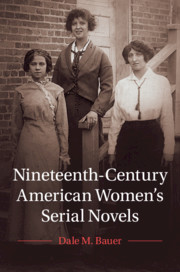Book contents
- Nineteenth-Century American Women’s Serial Novels
- Cambridge Studies in American Literature and Culture
- Nineteenth-Century American Women’s Serial Novels
- Copyright page
- Dedication
- Contents
- Illustrations
- Acknowledgments
- Preface
- Introduction
- Chapter 1 Why Read More Southworth?
- Chapter 2 Stephens and the Serial Novel
- Chapter 3 Women in Nineteenth-Century Prisons
- Chapter 4 Mary Jane Holmes’s Spooneys, Crackers, and “White Niggers”
- Chapter 5 Laura Jean Libbey and Sexual Transformation
- Chapter 6 Racial Intimacy and Serial Novels
- Conclusion
- Notes
- Bibliography
- Index
- Recent Books in this Series (continued from page ii)
Chapter 3 - Women in Nineteenth-Century Prisons
Published online by Cambridge University Press: 20 November 2019
- Nineteenth-Century American Women’s Serial Novels
- Cambridge Studies in American Literature and Culture
- Nineteenth-Century American Women’s Serial Novels
- Copyright page
- Dedication
- Contents
- Illustrations
- Acknowledgments
- Preface
- Introduction
- Chapter 1 Why Read More Southworth?
- Chapter 2 Stephens and the Serial Novel
- Chapter 3 Women in Nineteenth-Century Prisons
- Chapter 4 Mary Jane Holmes’s Spooneys, Crackers, and “White Niggers”
- Chapter 5 Laura Jean Libbey and Sexual Transformation
- Chapter 6 Racial Intimacy and Serial Novels
- Conclusion
- Notes
- Bibliography
- Index
- Recent Books in this Series (continued from page ii)
Summary
Chapter 3 illustrates how Southworth and Stephens depict women in prison as well as the convicts’ angelic states and the danger of prison nurses.
- Type
- Chapter
- Information
- Nineteenth-Century American Women's Serial Novels , pp. 49 - 67Publisher: Cambridge University PressPrint publication year: 2019

